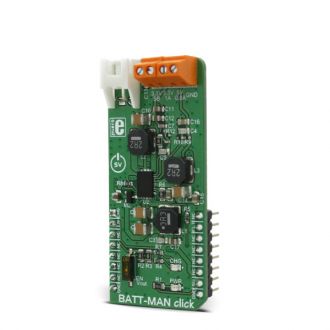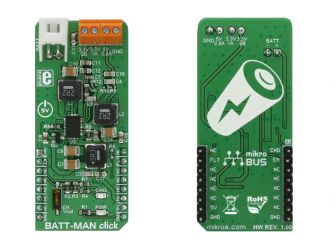
We strongly encourage users to use Package manager for sharing their code on Libstock website, because it boosts your efficiency and leaves the end user with no room for error. [more info]

Rating:
Author: MIKROE
Last Updated: 2018-01-31
Package Version: 1.0.0.0
mikroSDK Library: 1.0.0.0
Category: Buck-Boost
Downloaded: 5812 times
Not followed.
License: MIT license
BATT-MAN click is a very versatile battery operated power manager. When powered via mikroBUS, it will charge the connected LiPo 3.7V battery, while providing the output voltage on all its outputs at the same time.
Do you want to subscribe in order to receive notifications regarding "BATT-MAN click" changes.
Do you want to unsubscribe in order to stop receiving notifications regarding "BATT-MAN click" changes.
Do you want to report abuse regarding "BATT-MAN click".


Library Description
This library contains a single function for BATT-MAN click control.
Key functions
void battman_setEnable(uint8_t state) - Enables or disables click board operation
Examples Description
The demo application is composed of three sections:
void applicationTask()
{
battman_setEnable(1);
mikrobus_logWrite("Click enabled.",_LOG_LINE);
Delay_ms(10000);
mikrobus_logWrite("Click disabled.",_LOG_LINE);
battman_setEnable(0);
Delay_ms(10000);
}
Other MikroElektronika libraries used in the example:
Additional notes and information
Depending on the development board you are using, you may need USB UART click, USB UART 2 click or RS232 click to connect to your PC, for development systems with no UART to USB interface available on the board. The terminal available in all MikroElektronika compilers, or any other terminal application of your choice, can be used to read the message.